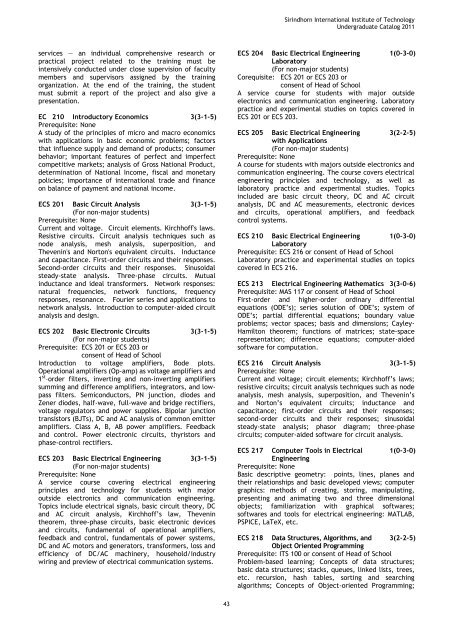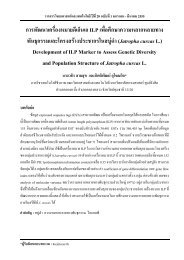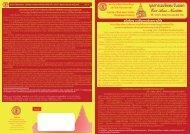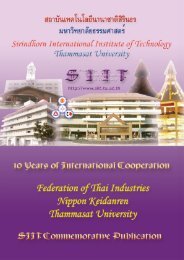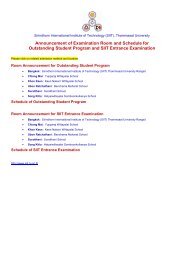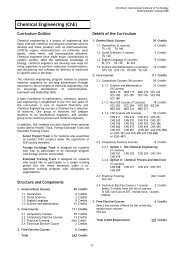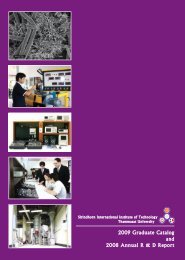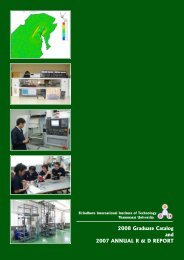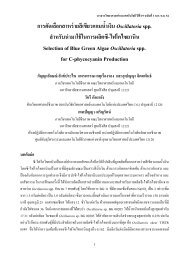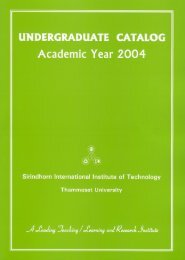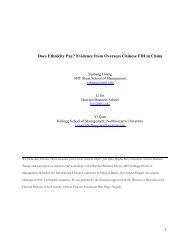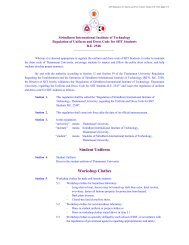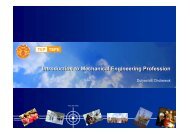Undergraduate Catalog, Academic Year 2011 - Sirindhorn ...
Undergraduate Catalog, Academic Year 2011 - Sirindhorn ...
Undergraduate Catalog, Academic Year 2011 - Sirindhorn ...
Create successful ePaper yourself
Turn your PDF publications into a flip-book with our unique Google optimized e-Paper software.
<strong>Sirindhorn</strong> International Institute of Technology<br />
<strong>Undergraduate</strong> <strong>Catalog</strong> <strong>2011</strong><br />
services — an individual comprehensive research or<br />
practical project related to the training must be<br />
intensively conducted under close supervision of faculty<br />
members and supervisors assigned by the training<br />
organization. At the end of the training, the student<br />
must submit a report of the project and also give a<br />
presentation.<br />
EC 210 Introductory Economics 3(3-1-5)<br />
Prerequisite: None<br />
A study of the principles of micro and macro economics<br />
with applications in basic economic problems; factors<br />
that influence supply and demand of products; consumer<br />
behavior; important features of perfect and imperfect<br />
competitive markets; analysis of Gross National Product,<br />
determination of National Income, fiscal and monetary<br />
policies; importance of international trade and finance<br />
on balance of payment and national income.<br />
ECS 201 Basic Circuit Analysis 3(3-1-5)<br />
(For non-major students)<br />
Prerequisite: None<br />
Current and voltage. Circuit elements. Kirchhoff's laws.<br />
Resistive circuits. Circuit analysis techniques such as<br />
node analysis, mesh analysis, superposition, and<br />
Thevenin's and Norton's equivalent circuits. Inductance<br />
and capacitance. First-order circuits and their responses.<br />
Second-order circuits and their responses. Sinusoidal<br />
steady-state analysis. Three-phase circuits. Mutual<br />
inductance and ideal transformers. Network responses:<br />
natural frequencies, network functions, frequency<br />
responses, resonance. Fourier series and applications to<br />
network analysis. Introduction to computer-aided circuit<br />
analysis and design.<br />
ECS 202 Basic Electronic Circuits 3(3-1-5)<br />
(For non-major students)<br />
Prerequisite: ECS 201 or ECS 203 or<br />
consent of Head of School<br />
Introduction to voltage amplifiers, Bode plots.<br />
Operational amplifiers (Op-amp) as voltage amplifiers and<br />
1 st –order filters, inverting and non-inverting amplifiers<br />
summing and difference amplifiers, integrators, and lowpass<br />
filters. Semiconductors, PN junction, diodes and<br />
Zener diodes, half-wave, full-wave and bridge rectifiers,<br />
voltage regulators and power supplies. Bipolar junction<br />
transistors (BJTs), DC and AC analysis of common emitter<br />
amplifiers. Class A, B, AB power amplifiers. Feedback<br />
and control. Power electronic circuits, thyristors and<br />
phase-control rectifiers.<br />
ECS 203 Basic Electrical Engineering 3(3-1-5)<br />
(For non-major students)<br />
Prerequisite: None<br />
A service course covering electrical engineering<br />
principles and technology for students with major<br />
outside electronics and communication engineering.<br />
Topics include electrical signals, basic circuit theory, DC<br />
and AC circuit analysis, Kirchhoff’s law, Thevenin<br />
theorem, three-phase circuits, basic electronic devices<br />
and circuits, fundamental of operational amplifiers,<br />
feedback and control, fundamentals of power systems,<br />
DC and AC motors and generators, transformers, loss and<br />
efficiency of DC/AC machinery, household/industry<br />
wiring and preview of electrical communication systems.<br />
ECS 204 Basic Electrical Engineering 1(0-3-0)<br />
Laboratory<br />
(For non-major students)<br />
Corequisite: ECS 201 or ECS 203 or<br />
consent of Head of School<br />
A service course for students with major outside<br />
electronics and communication engineering. Laboratory<br />
practice and experimental studies on topics covered in<br />
ECS 201 or ECS 203.<br />
ECS 205 Basic Electrical Engineering 3(2-2-5)<br />
with Applications<br />
(For non-major students)<br />
Prerequisite: None<br />
A course for students with majors outside electronics and<br />
communication engineering. The course covers electrical<br />
engineering principles and technology, as well as<br />
laboratory practice and experimental studies. Topics<br />
included are basic circuit theory, DC and AC circuit<br />
analysis, DC and AC measurements, electronic devices<br />
and circuits, operational amplifiers, and feedback<br />
control systems.<br />
ECS 210 Basic Electrical Engineering 1(0-3-0)<br />
Laboratory<br />
Prerequisite: ECS 216 or consent of Head of School<br />
Laboratory practice and experimental studies on topics<br />
covered in ECS 216.<br />
ECS 213 Electrical Engineering Mathematics 3(3-0-6)<br />
Prerequisite: MAS 117 or consent of Head of School<br />
First-order and higher-order ordinary differential<br />
equations (ODE’s); series solution of ODE’s; system of<br />
ODE’s; partial differential equations; boundary value<br />
problems; vector spaces; basis and dimensions; Cayley-<br />
Hamilton theorem; functions of matrices; state-space<br />
representation; difference equations; computer-aided<br />
software for computation.<br />
ECS 216 Circuit Analysis 3(3-1-5)<br />
Prerequisite: None<br />
Current and voltage; circuit elements; Kirchhoff’s laws;<br />
resistive circuits; circuit analysis techniques such as node<br />
analysis, mesh analysis, superposition, and Thevenin’s<br />
and Norton’s equivalent circuits; inductance and<br />
capacitance; first-order circuits and their responses;<br />
second-order circuits and their responses; sinusoidal<br />
steady-state analysis; phasor diagram; three-phase<br />
circuits; computer-aided software for circuit analysis.<br />
ECS 217 Computer Tools in Electrical 1(0-3-0)<br />
Engineering<br />
Prerequisite: None<br />
Basic descriptive geometry: points, lines, planes and<br />
their relationships and basic developed views; computer<br />
graphics: methods of creating, storing, manipulating,<br />
presenting and animating two and three dimensional<br />
objects; familiarization with graphical softwares;<br />
softwares and tools for electrical engineering: MATLAB,<br />
PSPICE, LaTeX, etc.<br />
ECS 218 Data Structures, Algorithms, and 3(2-2-5)<br />
Object Oriented Programming<br />
Prerequisite: ITS 100 or consent of Head of School<br />
Problem-based learning; Concepts of data structures;<br />
basic data structures; stacks, queues, linked lists, trees,<br />
etc. recursion, hash tables, sorting and searching<br />
algorithms; Concepts of Object-oriented Programming;<br />
43


